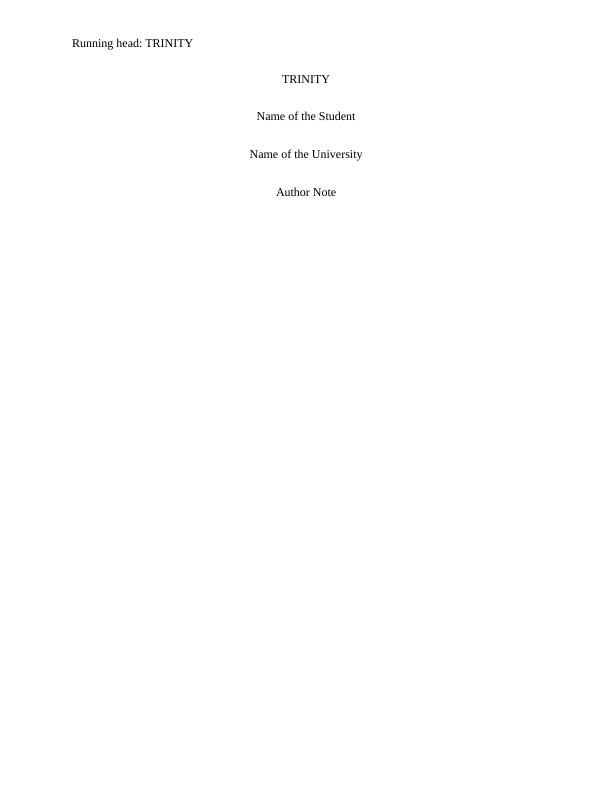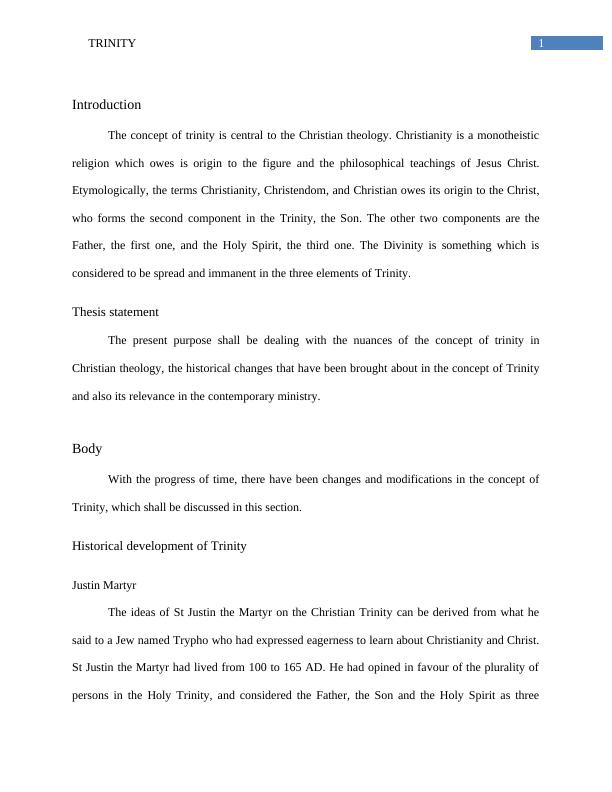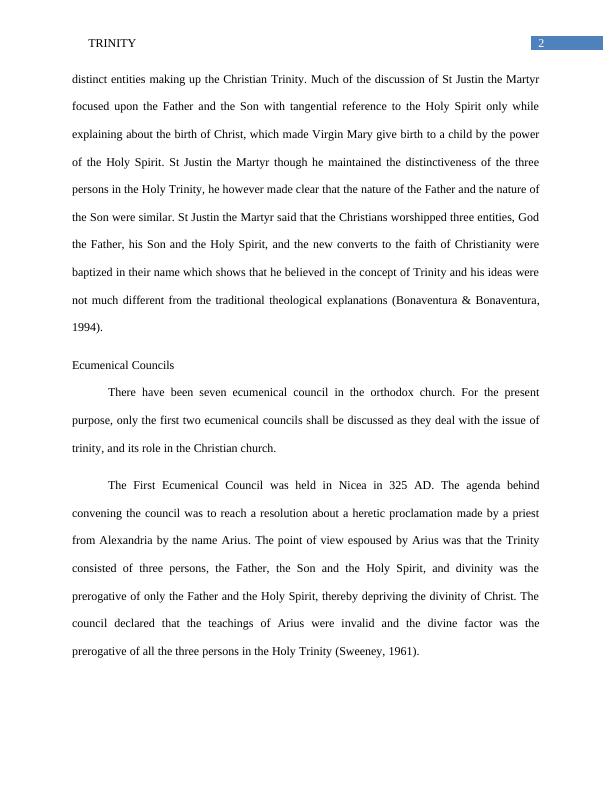The Concept of Trinity in Christian Theology
Added on 2022-12-15
6 Pages1234 Words245 Views
Running head: TRINITY
TRINITY
Name of the Student
Name of the University
Author Note
TRINITY
Name of the Student
Name of the University
Author Note

1TRINITY
Introduction
The concept of trinity is central to the Christian theology. Christianity is a monotheistic
religion which owes is origin to the figure and the philosophical teachings of Jesus Christ.
Etymologically, the terms Christianity, Christendom, and Christian owes its origin to the Christ,
who forms the second component in the Trinity, the Son. The other two components are the
Father, the first one, and the Holy Spirit, the third one. The Divinity is something which is
considered to be spread and immanent in the three elements of Trinity.
Thesis statement
The present purpose shall be dealing with the nuances of the concept of trinity in
Christian theology, the historical changes that have been brought about in the concept of Trinity
and also its relevance in the contemporary ministry.
Body
With the progress of time, there have been changes and modifications in the concept of
Trinity, which shall be discussed in this section.
Historical development of Trinity
Justin Martyr
The ideas of St Justin the Martyr on the Christian Trinity can be derived from what he
said to a Jew named Trypho who had expressed eagerness to learn about Christianity and Christ.
St Justin the Martyr had lived from 100 to 165 AD. He had opined in favour of the plurality of
persons in the Holy Trinity, and considered the Father, the Son and the Holy Spirit as three
Introduction
The concept of trinity is central to the Christian theology. Christianity is a monotheistic
religion which owes is origin to the figure and the philosophical teachings of Jesus Christ.
Etymologically, the terms Christianity, Christendom, and Christian owes its origin to the Christ,
who forms the second component in the Trinity, the Son. The other two components are the
Father, the first one, and the Holy Spirit, the third one. The Divinity is something which is
considered to be spread and immanent in the three elements of Trinity.
Thesis statement
The present purpose shall be dealing with the nuances of the concept of trinity in
Christian theology, the historical changes that have been brought about in the concept of Trinity
and also its relevance in the contemporary ministry.
Body
With the progress of time, there have been changes and modifications in the concept of
Trinity, which shall be discussed in this section.
Historical development of Trinity
Justin Martyr
The ideas of St Justin the Martyr on the Christian Trinity can be derived from what he
said to a Jew named Trypho who had expressed eagerness to learn about Christianity and Christ.
St Justin the Martyr had lived from 100 to 165 AD. He had opined in favour of the plurality of
persons in the Holy Trinity, and considered the Father, the Son and the Holy Spirit as three

2TRINITY
distinct entities making up the Christian Trinity. Much of the discussion of St Justin the Martyr
focused upon the Father and the Son with tangential reference to the Holy Spirit only while
explaining about the birth of Christ, which made Virgin Mary give birth to a child by the power
of the Holy Spirit. St Justin the Martyr though he maintained the distinctiveness of the three
persons in the Holy Trinity, he however made clear that the nature of the Father and the nature of
the Son were similar. St Justin the Martyr said that the Christians worshipped three entities, God
the Father, his Son and the Holy Spirit, and the new converts to the faith of Christianity were
baptized in their name which shows that he believed in the concept of Trinity and his ideas were
not much different from the traditional theological explanations (Bonaventura & Bonaventura,
1994).
Ecumenical Councils
There have been seven ecumenical council in the orthodox church. For the present
purpose, only the first two ecumenical councils shall be discussed as they deal with the issue of
trinity, and its role in the Christian church.
The First Ecumenical Council was held in Nicea in 325 AD. The agenda behind
convening the council was to reach a resolution about a heretic proclamation made by a priest
from Alexandria by the name Arius. The point of view espoused by Arius was that the Trinity
consisted of three persons, the Father, the Son and the Holy Spirit, and divinity was the
prerogative of only the Father and the Holy Spirit, thereby depriving the divinity of Christ. The
council declared that the teachings of Arius were invalid and the divine factor was the
prerogative of all the three persons in the Holy Trinity (Sweeney, 1961).
distinct entities making up the Christian Trinity. Much of the discussion of St Justin the Martyr
focused upon the Father and the Son with tangential reference to the Holy Spirit only while
explaining about the birth of Christ, which made Virgin Mary give birth to a child by the power
of the Holy Spirit. St Justin the Martyr though he maintained the distinctiveness of the three
persons in the Holy Trinity, he however made clear that the nature of the Father and the nature of
the Son were similar. St Justin the Martyr said that the Christians worshipped three entities, God
the Father, his Son and the Holy Spirit, and the new converts to the faith of Christianity were
baptized in their name which shows that he believed in the concept of Trinity and his ideas were
not much different from the traditional theological explanations (Bonaventura & Bonaventura,
1994).
Ecumenical Councils
There have been seven ecumenical council in the orthodox church. For the present
purpose, only the first two ecumenical councils shall be discussed as they deal with the issue of
trinity, and its role in the Christian church.
The First Ecumenical Council was held in Nicea in 325 AD. The agenda behind
convening the council was to reach a resolution about a heretic proclamation made by a priest
from Alexandria by the name Arius. The point of view espoused by Arius was that the Trinity
consisted of three persons, the Father, the Son and the Holy Spirit, and divinity was the
prerogative of only the Father and the Holy Spirit, thereby depriving the divinity of Christ. The
council declared that the teachings of Arius were invalid and the divine factor was the
prerogative of all the three persons in the Holy Trinity (Sweeney, 1961).

End of preview
Want to access all the pages? Upload your documents or become a member.
Related Documents
Council of NICEA 325 | Christianitylg...
|5
|1252
|18
The Trinity Theologylg...
|9
|2370
|69
THEOLOGY AND RELIGIOUS STUDIES Theology and Religious Studieslg...
|5
|478
|236
The Mind of the Maker: Book Report and Analysislg...
|5
|846
|397
Christian Trinity: A Constructive Christian Theologylg...
|5
|866
|112
THEOLOGY AND RELIGIOUS STUDIES.lg...
|13
|747
|35
